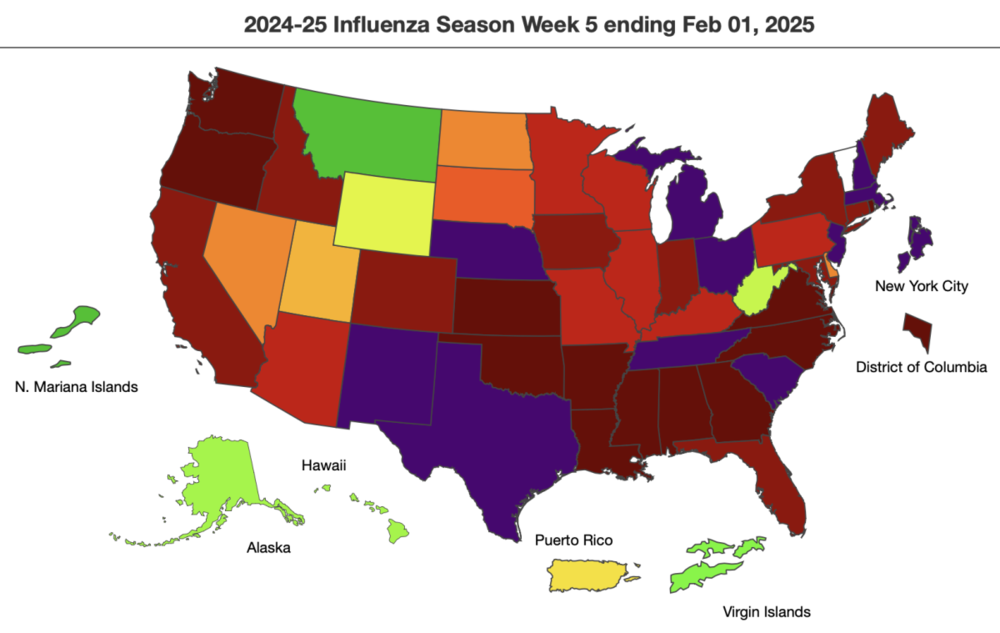
Caption
Dr. Thomas Craft (left) shows the Macon-Bibb County Board of Health the sharp spike in flu cases this season, which is the worst in 15 years.
Credit: Liz Fabian / Macon Newsroom

Dr. Thomas Craft (left) shows the Macon-Bibb County Board of Health the sharp spike in flu cases this season, which is the worst in 15 years.
Japanese magnolias may already be in bloom, but Georgia is still experiencing a robust flu season that is the worst in more than a decade.
Macon emergency medicine specialist Dr. Ali Kamran judges how bad it is locally by the number of patients coming into the emergency room at Piedmont Macon Medical Center.
“We are packed to the wall every day. Basically, we’re running all hands on deck. We’ve had to increase hours, add more staff just to be able to handle the volume,” Kamran told The Macon Newsroom.
He typically sees about 110 to 125 ER patients a day, but that number has risen to as high as 170 in recent weeks.
“Even 20 patients in a day in the ER is a pretty significant rise, and many of those patients are being admitted, so it’s definitely putting a stress on our hospital resources, beds, etc. And that is pretty common everywhere right now,” he said.
Dr. Thomas Craft, acting health director for the North Central Health District, agreed.
“Currently across the state and the country, we’re seeing the highest instances of influenza-like illness in 15 years. Hospitals are suffering,” Craft said at Monday’s Macon-Bibb County Board of Health meeting.
Atrium Health Navicent’s Chief Medical Officer Dr. Patrice Walker, who also serves on the local health board, also said that although it is normal for flu season to peak around this time, this year seems worse.
“We are hurting bad,” Walker told the board.
After the holidays, Atrium Health Navicent put temporary visitor restrictions in place due to the increasing number of respiratory viruses.
Children 12 and under and those with respiratory symptoms are urged not to visit acute care hospitals, rehabilitation units, inpatient hospice, infusion centers and cancer care facilities.
Visitors are asked to mask when visiting patient care areas and waiting rooms.
The last week in January was particularly difficult for flu cases, but the Medical Center also was treating patients with COVID and Respiratory Syncytial Virus or RSV, Walker said.
The CDC’s evaluation of the effectiveness of this season’s flu vaccine in the Northern Hemisphere has not yet been released, but recent reports from the Southern Hemisphere’s earlier flu season show a 34.5% rate of keeping people out of the hospital, which is within normal range, according to flu.com.

Shades of maroon to purple show states with very high levels of influenza-like-illness at the beginning of February.
Across the country, there have been 24 million flu cases, 13,000 deaths and 310,000 hospitalizations reported so far this season.
Physicians also see a decline in people getting the flu shot in the years since COVID-19.
“Anecdotally, what I’ve seen is not a lot of people that previously would have gotten the seasonal flu vaccine skipped on it this year. And that probably definitely plays a role,” Kamran said.
As of late January, 146.2 million doses of flu vaccine have been distributed across the U.S. since late July, down nearly 30 million from the same months in 2021-22.
Walker, too, has noticed flu vaccine hesitancy which she attributes to people not taking the flu as seriously as they did the coronavirus.
“I think people never put flu in the same category as something like COVID in terms of like, ‘COVID will kill you.’ Well, the flu will too, you know, but we just never thought about it like that,” Walker said.
Georgia’s flu season started off slowly in October, then cases escalated from moderate to high levels by the end of November. Since the beginning of the year, cases have held at the very high range.
No one knows exactly how many influenza cases Macon-Bibb County and surrounding counties have seen. Not everyone sees a doctor and counties are not required to document individual cases of influenza as they must for other infectious diseases.
“In Georgia, cases of influenza are not a reportable condition to Public Health, with the exception of clusters of influenza-like illnesses (ILI) and individual flu-related deaths,” said Michael Hokanson, public information officer the North Central Health District.
The Georgia Department of Public Health does keep an eye on outbreaks of respiratory viruses and tracks the impact that infections have on illness, hospitalizations and deaths.
The Georgia Department of Public Health, or DPH, receives data from the CDC and the Emerging Infections Program that feed information to the Influenza-Like Illness Surveillance Network, or ILInet, that maps out conditions across the country.
Between early October and Feb. 1, Georgia logged 98 flu outbreaks, nearly 2,972 hospitalizations in metro areas and 25 deaths.
Kamran expects the number of flu cases to precipitously drop in the coming weeks, but says it is not too late to get a flu shot, especially for the elderly and those with comorbidities.
“I think if you fall into that higher risk group, I would definitely consider that and discuss with your doctor,” he said.
With flu cases remaining at very high levels, those with injuries or non-threatening illness of any kind should think about using an urgent care facility to reserve the ER for serious emergencies.
Walker believes that flu patients who are otherwise “walking well” could stay home and self-medicate. If they don’t get better, then see a doctor or go to an urgent care facility.
Adopting a “stop-the-spread” mentality is a good strategy, she said.
“All the things we talked about during COVID about social distancing, you don’t hear that anymore, but that’s hand hygiene, wearing a mask. All of those things are still perfectly good and we should all be practicing those things when we’re out during this time of the year based on your own risk profile,” she said.
— Civic Journalism Senior Fellow Liz Fabian covers Macon-Bibb County government entities and can be reached at fabian_lj@mercer.edu. This story comes to GPB through a reporting partnership with The Macon Newsroom.